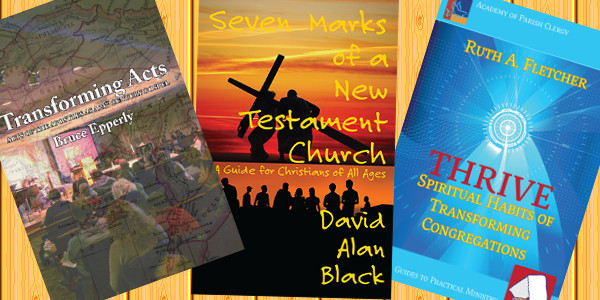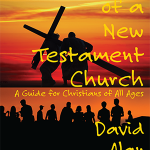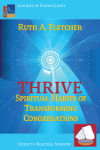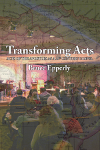Seven Marks: Genuine Relationships
 The fourth mark of a New Testament church that Dave Black finds in Acts he calls genuine relationships. The early believers devoted themselves to the fellowship, to their community. There are so many words for it.
The fourth mark of a New Testament church that Dave Black finds in Acts he calls genuine relationships. The early believers devoted themselves to the fellowship, to their community. There are so many words for it.
 In America today we rarely think of the church as a community and even more rarely as our community. Yet much of the New Testament’s teaching on the church centers around things that relate closely to this idea. We go to church for a “service.” We don’t participate in community. We take our children there for some moral education, not so that they can build relationships for their life. Often we barely know one another.
In America today we rarely think of the church as a community and even more rarely as our community. Yet much of the New Testament’s teaching on the church centers around things that relate closely to this idea. We go to church for a “service.” We don’t participate in community. We take our children there for some moral education, not so that they can build relationships for their life. Often we barely know one another.
I’m not trying to make us all extroverts. I’m an introvert. I tend to make small numbers of closer friendships. I’m not talking about the number of friendships we each make. I’m talking about how we fit together into this larger community, one that includes various personalities, a wide variety of gifts, people who are like us, and also people who are not-at-all like us.
What we think about our community is going to impact everything else we do. Dave’s first mark is “evangelistic preaching.” That’s proclamation of the good news. But is the “good news” of your church the idea that one can join up, provided they’re not too different and become just like everyone else there? Or is the good news that through God’s Spirit we can all, with our various backgrounds, become one in Christ Jesus, contributing with various gifts, and receiving the salvation and healing that Jesus offers?
I suggest reading 1 Corinthians 12-14. Don’t skip over chapter 13. So frequently people who want to study about spiritual gifts study chapter 12, those who want to look at church order and how to structure your meetings at the church read chapter 14, and those who want to talk about love read chapter 13.
But that is to miss what Paul is doing. In this book Paul is looking at the various reasons why there are factions in the Corinthian church. When he comes to the start of chapter 12 he’s looking at the great gifted ones who lord it over everyone else. Genuine love, as expressed in chapter 13 is the key. How can one identify genuine gifts in action? It’s by the way they operate under the direction of that one Spirit and the way they carry out love in the church.
1 Corinthians 13 is not about marriage but about the church. It gives good advice for a marriage because it tells us how genuine relationships work.
 How do followers of Jesus work together when the church meets? Chapter 14 tells us they work for “edification.” That’s building. That building is based on the genuine love that is expressed in chapter 13. So these three chapters work together.
How do followers of Jesus work together when the church meets? Chapter 14 tells us they work for “edification.” That’s building. That building is based on the genuine love that is expressed in chapter 13. So these three chapters work together.
I heartily recommend Dave’s chapter, but I’m going to quote this time from Ruth Fletcher in the book Thrive: Spiritual Habits of Transforming Congregations. Fletcher defines a difference between “friendliness” and “welcome”:
Friendliness assimilates newcomers into what already exists; welcome integrates newcomers by helping them know they belong. Friendliness says, “We’re glad you came to our table. We hope you feel at home here eating what we like to eat and doing things the way we like to do them.” Welcome goes beyond friendliness to say, “We want you to bring your gifts to this community. We know when you offer those gifts that we will be changed by your presence among us.” (p. 78)
Fletcher implicitly provides us with a good description of community. Rather than being a place where the current members give and others receive, it’s a place that welcomes people to become part of the giving, whatever it is that they may have to offer.

One of the critical things we need to look at in the church if we are to be such a community is gossip, judgment and criticism. For us to help one another grow, we need to be able to talk about ways to grow. Serious discussion of spiritual growth will not prosper where there is no trust, and gossip destroys trust. Gossip is always followed by judgment and criticism, and it destroys community.
Losing this spirit of judgment does not mean that one loses the ability to discern between different options, nor that one cannot recognize sin or destructive behavior. It does involve a change in the way we think and talk about these things. Our talking will be impacted by our thinking. Don’t imagine that you can pretend not to be judgmental and nonetheless deal with issues as a community.
I’m fairly unreceptive of the complaints of those who think that repenting of gossip, judgment, and criticism (three sins endemic in church life) means that we can no longer reform or call others to repentance. Gossip, judgment, and criticism don’t result from a genuine desire to help others find repentance. They result from our desire to feel that we are better than others and to let others in our inside group know that we are better than others.
A genuine concern for others will result in talking to them and doing it in constructive way. Note that this isn’t a strategy change. It’s repentance from a sinful approach (judgmental) and a turn to a genuinely constructive approach (edifying/building). If we have genuinely repented of the need to feel morally superior to others, I think we will generally know the difference. Most of us have been helped to find a better approach to some issue by a more experienced or knowledgeable friend. It feels different.
One critical point is that it comes from relationship. I have friends who help me with my business decisions who can quite comfortable tell me that some idea would be idiotic. We’ll laugh and go on to a better plan. Why can we do that? Because we have a relationship that comes before the correction. I highly value those friends and that correction. It has saved me from many errors.
“Genuine relationships” open the way to the various elements of community. If you truly want to help those you think are on a wrong path, establish a genuine relationship with them first. As you do so, you may become aware that you also have things in your life that can be improved by what you learn from them.
I think back on growing up in my missionary family’s home. You could not visit my parents’ church without getting invited to lunch. Not invited to join us at a restaurant, but to come join us for the family meal. My mother always made sure she had enough to feed guests. One never knew who would be a guest.
In Mexico, when a mother and son needed refuge from violence, she was invited into our home, even though there was a threat of violence to us involved. She was different from us, of the Chamula people, and only spoke a bit of Spanish, much less any English. But she had a home with us as long as she needed it.
Think about your own church. Would a visitor be welcome? Any visitor? As you bring in new members do you try to remold them after your own image or do they become a genuine part of the church family with their gifts and their warts? Does anyone in your church invite people home to lunch or dinner? Are your homes open? If someone was escaping domestic violence would they get a referral to a nearby shelter or would someone in your church open heart and home to them? If you see young people in your church without parents do you gather in groups to complain about “this generation” or do you decide to welcome the opportunity to get to know them and even mentor them?
I think becoming a community built on genuine relationships will require a great deal of repentance on the part of the American church. But if we want to truly be disciples of Jesus, carrying out the gospel commission, this is one mark we can’t afford to lack!


Our study continues tomorrow evening with a look at chapter 4 of Dave Black’s book Seven Marks of a New Testament Church, “Genuine Relationships.” In this chapter, Dave discusses the church as community. I wrote an extended post on it when I was blogging through the book some time ago. I recommend reading that, and paying particular attention to the definitions provided by Ruth Fletcher. I’ve quoted a key line in the featured image, but in that earlier post I quote more and discuss at greater length.
Share this:
Facebook
Twitter
LinkedIn
Google
Some time ago, in fact, on the trip Jody and I took when she met my parents, I had a half-awake dream/vision. I saw a little church building in a mountain valley. I woke up and told Jody about it and that I thought we’d see it on the trip and we would stop and pray for the people there. As we were driving through Kentucky, we came around a corner in the mountains and there it was.
I’m not presenting this as a miraculous occurrence, because it has coincidence and selective memory written all over it. What it does show is my own attitude. I really loved that scene. The sun was shining through partial cloud cover, and the valley itself could have served as a painting or photograph. We did, in fact, stop and pray. I still remember the scene, though I can’t remember the name of the town.
I love beautiful church architecture. I like to look at good stained glass windows. There is some stained glass that falls somewhat short of “good.” I love to see and listen to a good pipe organ. I recall a hand carved pulpit I saw once with four historical figures in the church. It was beautiful. I enjoyed it.
Still, I have a problem with all this, and the longer I live, and the more I think about serving Jesus, the more concerned I become.
You see, I believe that our churches, by which I mean the people, should be there to create community, and that community should witness to the love of Jesus. I believe that every member should be a minister, that every member is called to priesthood, and that, indeed, the church as the body of Christ is called to a priestly ministry of connection between the divine and the human. (I’m not going to present arguments for this view here. You can read my post Seven Marks: Genuine Relationships for some quotes and comments from multiple writers.)
I don’t, however, think that our church architecture or our worship practice reflects this reality, or perhaps I should call it a hope. I recall once tweeting during a sermon in which the speaker was lecturing with vigor on the importance of participation, of everyone being involved. I asked the question, “Am I the only one who finds it strange to be lectured on participation in a monologue?” Well, am I?
To me, church architecture speaks separation. We have the raised platform, the decorated pulpit (yes, even the ones I really like), the table that’s sort of like the table of the presence. Worship is guided from the front and the single presenter gives a lecture. When invited to preach I personally like to avoid standing behind the pulpit or lectern, though often this is not possible due to the sound system. Hmmm. Don’t get me started on sound systems!
The sanctuaries of our churches reflect a structure that goes back to ancient temples, in which it very much reflected the separation between the actual divinity, often thought to dwell in a special way in the inner sanctum, and the worshipers outside. The priests, then connected the people to the god(s), though never permanently. The channel was always through the priests.
Now don’t think what follows is “New Testament.” But looking back, we see in Exodus 19:6, that God was inviting all the people to hear. Then in Exodus 20:19, the people indicate they’d rather hear from Moses. Now don’t go into the “those stupid, stubborn Israelites” mode. It’s always entertaining when studying these passages to hear people’s claims of how much more faithful they would have been. So, all ye faithful people, tell me this: What happened to the church? It surely must be a shining light at all times, considering what faultless people we are! Well, perhaps, not so much.
But the book of Hebrews tells us that Jesus opened up a new and living way and invites us to follow it, to each approach the throne of grace boldly. So the separation should go. Yet we put that into practice on a regular basis. We treat the pastor as priest. We have an “active” and “inactive” portion.
I think the fellowship hall is a much better representation of what the church should be. Perhaps we could quit building church sanctuaries and just build fellowship halls with some educational/small group rooms attached. Perhaps we could have each Sunday service sitting around tables while we share a meal and all share with one another. Hey, we could even bless this meal and call it communion!
Then we can move the tables and the chairs and share food, clothing, and love with those in need during the week as well. (We did invite them to share our common meal on Sunday, didn’t we?) We could bring them in for social and educational events. We could get everyone involved.
Of course, this is all very frightening. If you get people in touch with the divine on their own, then they may not always follow the directions and ideas of the people in charge. If everyone can participate, someone might say something wrong! What would we do then?
Featured Image Credit: Openclipart.org
I have shocking news for you. Wrong things are said from pulpits around the world every week, and yet here we are. Yes, there are ideas for order, correction, and accountability, ideas that are often not applied to our pastors when they should be. Read 1 Corinthians 12-14 in sequence. What do you think the “edifying” church service in Corinth would have looked like? If Paul introduces ways to correct, is there not a possibility that wrong things got said in this service? That’s where mutual accountability comes in. I’ve seen churches where there were designated people to do correction or to choose who could speak. That’s not what I’m talking about. I’m talking about mutual accountability, where everyone and everything can be questioned and discussed.
A couple of weeks ago I posted this quote from author Herold Weiss, from his book Meditations on According to John:
I think a great deal of what we do is designed to help the Holy Spirit blow where we desire, not where he desires (John 3:8). Or rather, our problem is that people may mistake the leading of the Holy Spirit if they don’t have our help. We want the Spirit flowing under ecclesiastical control, along with the worship service, the presentation of the Word, and all activities of the church.
And right there in our church architecture we embalm and entomb this attitude that suggests that people in general are incapable of knowing God’s will, and need the leaders of the church to keep them straight. Is there value in expert teachers? Of course! But when those expert teachers become expert controllers, then community suffers. They can make points that are quite accurate, while destroying the practical impact of what they teach. They can become, like that speaker I mentioned advocating participation, advocates of something they will not do.
Do we trust in God? That’s always a good question. Generally, I think, we’re afraid that God can’t lead people where God wants them to go. We’d like a mighty wind of the Holy Spirit, but only if that wind blows in a wind tunnel of our choosing, preferably without mussing up our hair.
Share this:
Facebook
Twitter
LinkedIn
Google